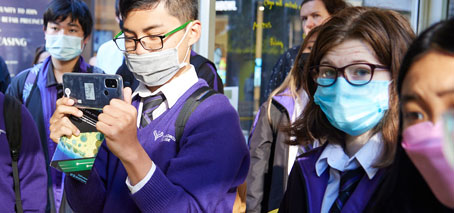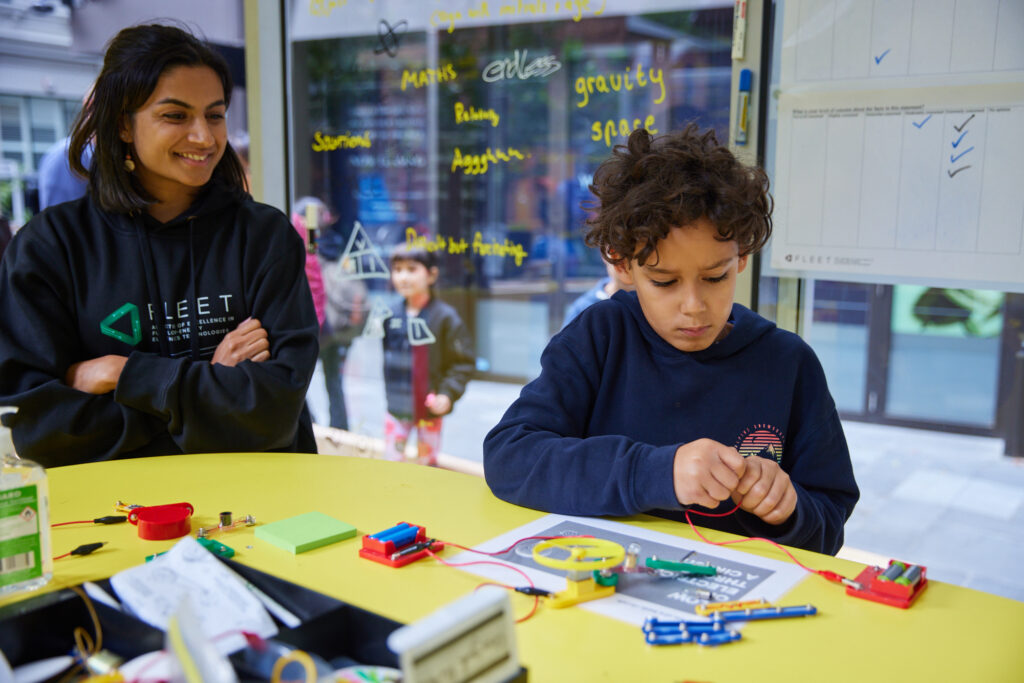
FLEET PhD student Karen Bayros (RMIT) supervises building electrical circuits. Photo by Sarah Chavdaroska
Over the course of Melbourne Knowledge Week last week FLEET volunteers engaged with around 300 visiting members of the public, talking about FLEET’s mission to ensure a sustainable future for computing, with some fun props to demonstrate electromagnetic forces and the role of quantum materials such as superconductors.
The bright yellow sustainable computers stall at the new MKW festival hub in Lonsdale St in the Melbourne CBD was an inviting venue to demonstrate hands-on science linked to FLEET research, and to engage visitors in discussions about the role of science in community well-being, energy consumption in computing, and fundamental research such as FLEET’s.
FLEET volunteers over the course of the week included Michael Barson, Bernard Field, Yi-Hsun Chen, Jesper Levinsen and Meera Parish from Monash Universty, and Caiden Parker, Karen Bayros, Yik Lee and Patjaree Aukarasereenont from RMIT. The booth was coordinated by FLEET outreach coordinator Jason Major.
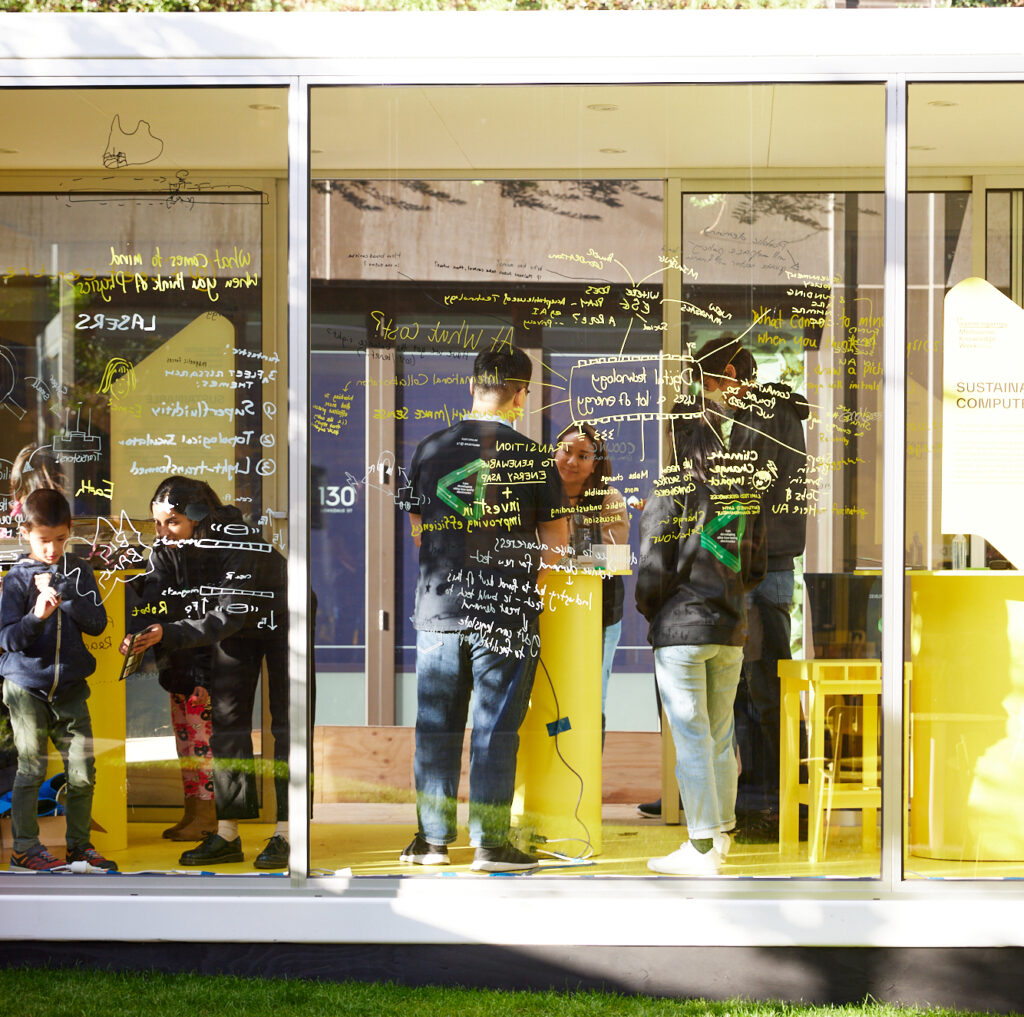
FLEET’s sustainable computing stand joined other future technology exhibits in the MKW ‘prototype street’ in the CBD. Photo by Sarah Chavdaroska
As well as valuing the opportunity to practice their public science outreach, FLEET’s volunteers enjoyed hearing visitors’ own science/technology stories, and sharing time with other Centre members from different disciplines.
“Thanks to conversations with other FLEET volunteers in the booth, I learned quite a lot about the physics behind quantum locking, resistance, and how we’ve reached a limit with silicon-based processors,” said FLEET/RMIT PhD student Caiden Parker.
“It was very interesting listening to visiting members of the public, who provided interesting insights and knowledge, for example on what they do for work, and what they knew already about these areas of science.”
“It was a great experience trying to teach younger children or people who don’t know too much science about what FLEET is trying to achieve and what I do as a researcher in material science.”
FLEET also polled visitors’ appreciation and awareness of physics, their hopes for future computing, and their levels of knowledge and concern about computing-energy consumption issues.
“We spoke to people from so many different backgrounds; former electricians, psychology teachers, people who work as part of the government, children who just wanted to play with the cool moving things,” says FLEET/RMIT PhD student Karen Bayros. “It was so interesting to hear what people thought about the importance of low energy electronics, and also their opinions on technology altogether.”
“One memorable chat I had was about whether technology was ‘natural’ or not, and whether we should be sacrificing some of the conveniences technology brings, to try and lower the amount of energy we require. Because we don’t need the technology to live and the further it advances the more energy it demands. The conversation progressed to contemplating human nature, whether people would make these sacrifices, and how we could limit people’s access to technology without impinging on their human rights. As for whether technology is natural or not, we discussed that the smart human brain was able to develop technology, so is that not a natural consequence of our crazy natural human brain? If our brains were able to develop technology, hopefully they are clever enough to also figure out how to solve the energy problems that arise from it.”
Melbourne Knowledge Week showcases cool science and engineering projects in the city of Melbourne, connecting non-scientists with the research and technology around them. This is the fourth year that FLEET has hosted a stall at the event.
Evaluation
Evaluation is built into FLEET outreach: each outreach event is designed from the outset to allow evaluation, assessment and measurement against Centre goals. Evaluation around Melbourne Knowledge Week determined that:
- Despite zero or low initial awareness of the increasing energy use of digital technologies, once aware of the problem, the public had a relatively high concern (reinforcing previous analysis)
- Key concerns related to the environment (including the sourcing of new materials), social components (such as responsible uses of technologies such as AI) and governance (eg, the funding of basic vs applied research)
- People sought a sustainable digital future via responsible innovation
- People thought critically about FLEET research at FLEET’s research problem, eg balancing environmental positives of reduced energy consumption with risk of environmental damage via new materials mining.
- Dialogue was important to facilitate acceptable research and sustainable outcomes
- FLEET’s volunteers gained a new perspective and understanding of the public as an audience that enabled more effective communication. They saw value in communicating with the public. There was reinforcement that their research has value and meaning.
Full evaluation report available (PDF)
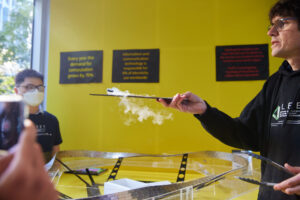
Yik Lee (RMIT) and Jason Major (FLEET) demonstrate the superconducting magnet track. Photo by Sarah Chavdaroska
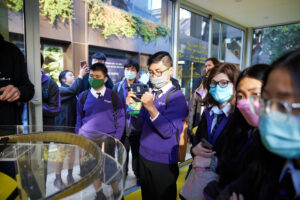
School students. Photo by Sarah Chavdaroska
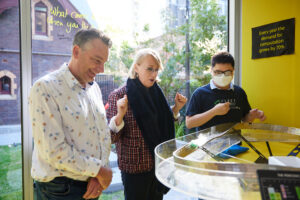
Lord Mayor Sally Capp visits the stand. Photo by Sarah Chavdaroska

